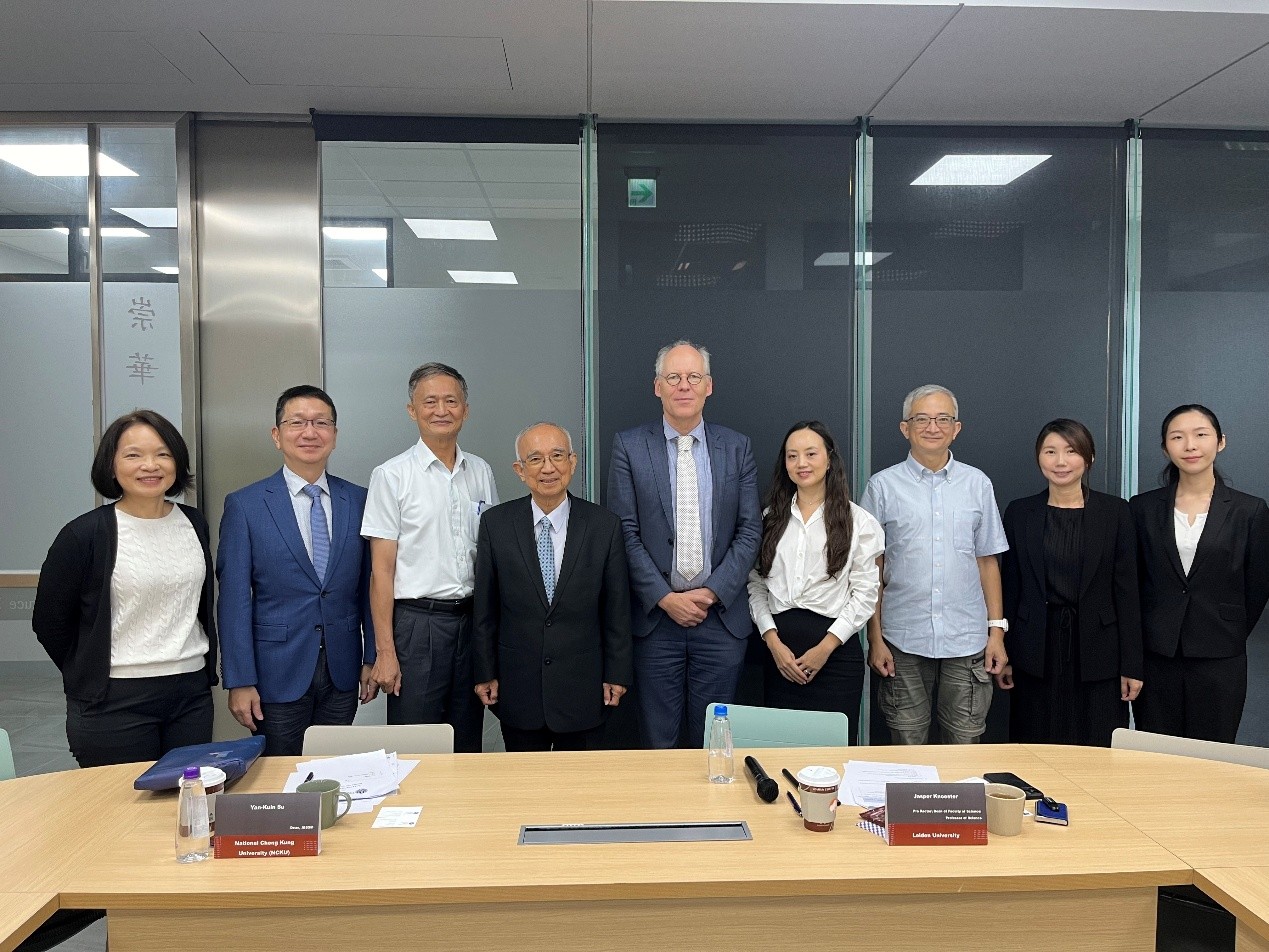Leiden University and NCKU to Expand Collaboration
Written by NCKU Office of Internation Affairs. Image credit to NCKU News Center.
On the morning of August 28, 2025, Pro Rector and Dean of Faculty of Science Jasper Knoester, along with Ms. Yun Tian, Policy Officer Internationalization, Faculty of Science, Leiden University (LEI), visited National Cheng Kung University (NCKU). They were welcomed by NCKU Executive Vice President Yung-Chun Lee and representatives from various colleges to conduct a university-level meeting and a visit to the Academy of Innovative Semiconductor and Sustainable Manufacturing (AISSM) focused on collaboration between NCKU and Leiden University. The discussions centered on quantum computing, artificial intelligence, environmental science, and semiconductor fields, exploring research initiatives, co-supervision of graduate students, short-term training programs, student exchanges, and faculty mobility.
NCKU Executive Vice President Lee expressed gratitude for Pro Rector Knoester's visit, believing that face-to-face interactions would strengthen the existing foundation and facilitate further collaboration opportunities. He also highlighted the long-term exchange history between the two universities, noting that since signing the university-level Agreement of Academic Co-operation and Exchange in 2005, both institutions have enjoyed a fruitful and growing academic partnership. From 2020 to 2025, the two institutions co-authored research primarily in medicine, physics and astronomy, and earth sciences, establishing a solid groundwork for cooperation.

Leiden University and National Cheng Kung University have been conducting student exchanges since 2005.
Pro Rector Knoester stated that both universities are comprehensive universities with diverse academic fields. In recent years, LEI has focused on six strategic research themes: quantum and space, drug discovery and development, artificial intelligence, complex networks, biodiversity, and sustainability, while encouraging interdisciplinary cooperation. Pro Rector Knoester hopes to explore co-supervision of graduate students and dual degree programs in addition to the existing exchange program and invite NCKU scholars to participate in the Taiwan Research Day, scheduled for March 2026 at LEI.
NCKU's Vice President for International Affairs, Chair Prof. Sun-Yuan Hsieh, presented an overview of the current collaboration between NCKU and LEI, particularly noting that the co-authored research has a Field-Weighted Citation Impact (FWCI) of 35.79, indicating the outstanding performance. He expressed optimism for a stronger initiative for international student mobility in the future, the establishment of an annual faculty exchange mechanism, and the encouragement of exchanges among graduate students in laboratories, which would enhance collaborative research efforts.

Collaboration between NCKU and LEI aims to expand initiatives in quantum computing, artificial intelligence, environmental science, and semiconductor fields.
Dean of the College of Science, Prof. Chin-Chun Tsai, mentioned that NCKU's forefront research centers, including the Center for Quantum Frontiers of Research & Technology (QFort) and the Han-Ming Hsia Space Science and Technology Center, have demonstrated excellent research performance and international collaboration results, aligning with both institutions' future cooperative strategies. Dean of the College of Electrical Engineering and Computer Science, Prof. Shyhtsun Felix Wu, emphasized the importance of enhancing research collaboration and industrial development, particularly the profound impact that artificial intelligence development and application will have on society. He stressed the need to integrate interdisciplinary knowledge, not only in engineering, computer science, or mathematics, but also in the humanities and social sciences. He also shared about the integration plan for an AI campus.
Vice Dean of the College of Engineering, Prof. Chien-Hsiang Chang, highlighted that NCKU has a strong engineering background covering various engineering domains and looked forward to reciprocal research visits. Dean Yan-Kuin Su and Vice Dean Ming-Chi Chou from the Academy of Innovative Semiconductor and Sustainable Manufacturing (AISSM) emphasized the importance of international partnerships, sharing that NCKU's AISSM has established locations in Europe, leading research centers in physics, semiconductors, and materials located in Riga, Latvia, and Vilnius, Lithuania, actively supporting Taiwan's national policies and talent cultivation programs in response to industrial needs.

LEI's visit to NCKU AISSM involved discussions on collaborations for short-term training, Dual PhD programs, and research opportunities.
The NCKU representatives participating in the university-level included Chair Prof. Yung-Chun Lee, Executive Vice President; Chair Prof. Sun-Yuan Hsieh, Vice President for International Affairs; Prof. Chin-Chun Tsai, Dean, College of Science; Prof. Shyhtsun Felix Wu, Dean, College of Electrical Engineering and Computer Science; Prof. Chien-Hsiang Chang, Vice Dean, College of Engineering; Prof. Sheng-Fu Liang, Department of Computer Science and Information Engineering; Prof. Tsunglin Liu, Director, Division of International Relations; Ms. Ya-Tsui Ellen Hsueh, Deputy Director, International Relations Division; Mr. Cyrus Hung, Manager, International Relations Division. The discussion in AISSM are participated by Dean Prof. Yan-Kuin Su, Associate Dean Prof. Wei-Chou Hsu, Associate Dean Prof. Ming-Chi Chou, Deputy Director Assoc. Prof. Chih-Hung Kuo, Program on IC Design, Director Ms. Weili Teng and Executive Officer Ms. Phoebe Lu, Academic & Student Affairs and International Relations.
Founded in 1575, Leiden University, located in Leiden, Netherlands, is the oldest university in the country, with a total student enrollment of 34,178, including international students from 120 countries. The top three academic output fields from 2020 to 2025 are Medicine (46.7%), Biochemistry and Molecular Biology (16%), and Social Sciences (15.9%). In terms of co-authored research, NCKU and Leiden University have primarily focused on Medicine (38.5%), Physics and Astronomy (30.8%), and Earth Sciences (15.4%).
Provider:
NCKU News Center
Date:
2025-09-09
Click Num:
Share

